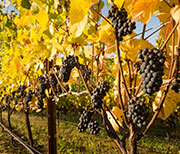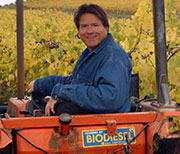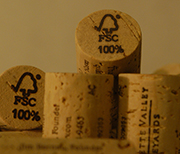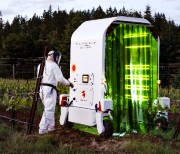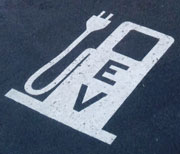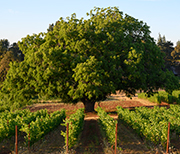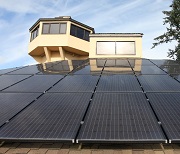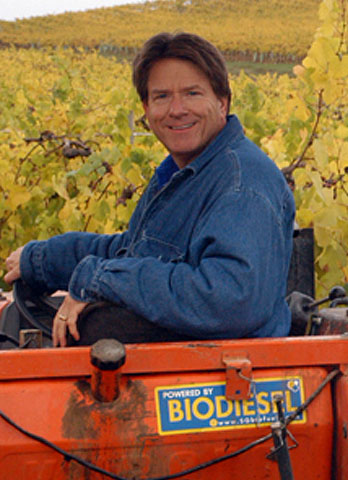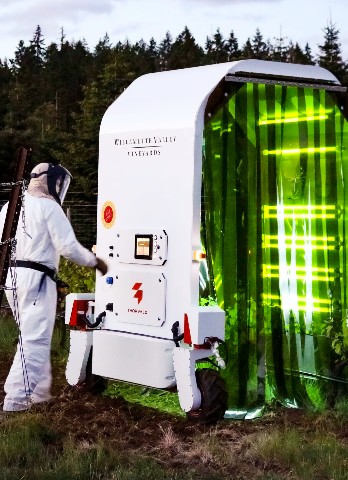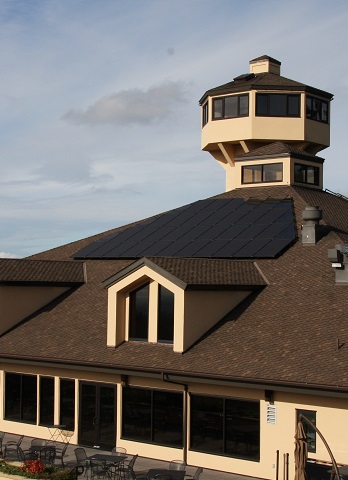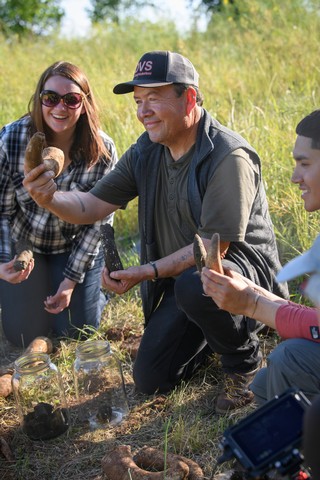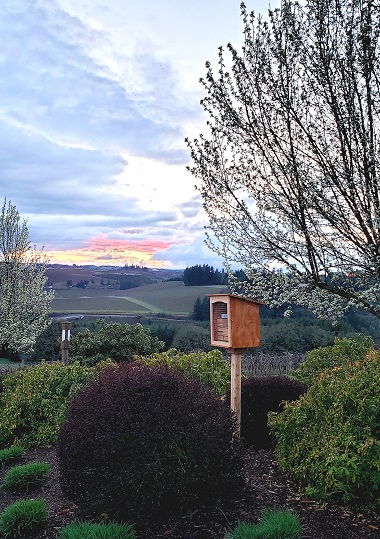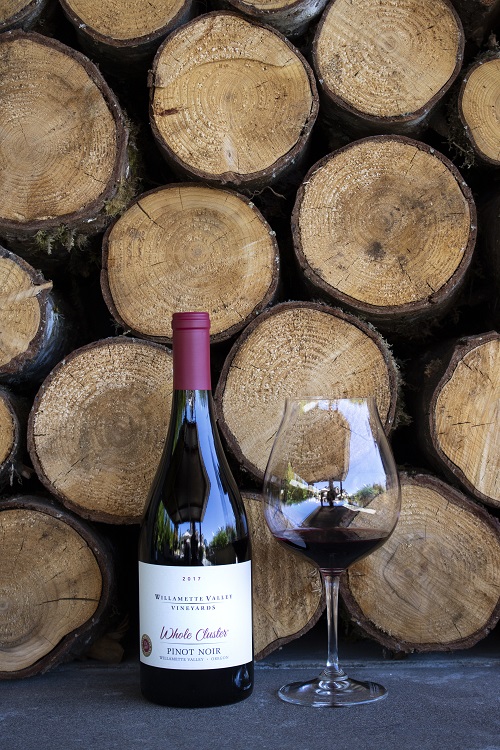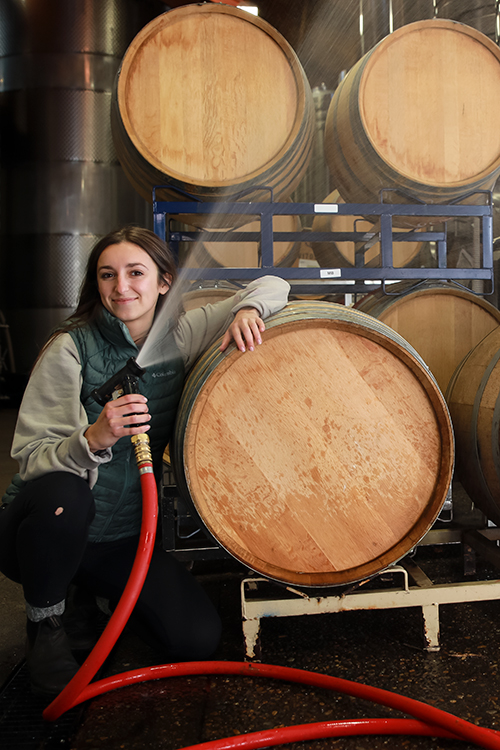Sustainability
Stewardship of the Land
Since the winery's founding in 1983, stewardship of the land has been a key principle in our winemaking and farming practices. Founder Jim Bernau believes Pinot Noir made with consideration for the environment, employees and community simply tastes better.
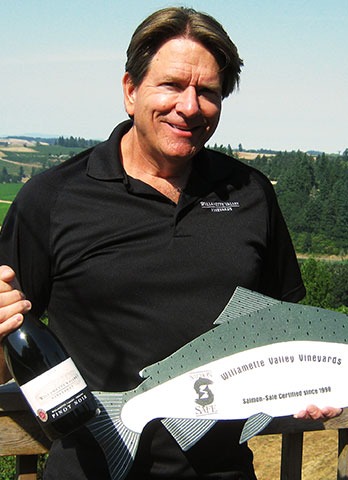
LIVE & Salmon-Safe
Environmental Certifications
Our vineyards are certified sustainable through LIVE and Salmon-Safe. This includes 67 acres of vinifera at our Estate Vineyard in the Salem Hills, 171 acres at Tualatin Estate Vineyard in Forest Grove, 67 acres at Elton Vineyard in the Eola-Amity Hills and 16 acres at our Bernau Estate Vineyard in Dundee. LIVE is certified through the International Organization for Biological Control (the international standard for sustainable agriculture). The whole farm system certification includes preventative measures for water runoff into streams, natural pesticide management and riparian areas.
In 2011, Founder Jim Bernau was recognized by Salmon-Safe with the very first “Hero of Salmon” award for the implementation of his high-impact Salmon-Safe “SIP-SAVE” campaign in print, retail, web and vehicle wraps.
In 2025, Elton Vineyard Founder Betty O'Brien received the "Hero of Salmon" award for environmental stewardship at Elton Vineyard. Examples of sustainable practices at the vineyard include stream habitat conservation, pollinator enhancement and protecting water quality in the Willmatte River watershed.
Biodiesel
The Willamette Way
We love our biodiesel! In 2005, Founder Jim Bernau launched an employee biodiesel program offering 50 gallons of biodiesel a month to each employee, at no cost. When our employees, delivery vehicles and tractors use biodiesel, we can help lower CO2 exhaust emissions and reduce the impacts of climate change. To learn more about biodiesel and our provider, please visit SeQuential.
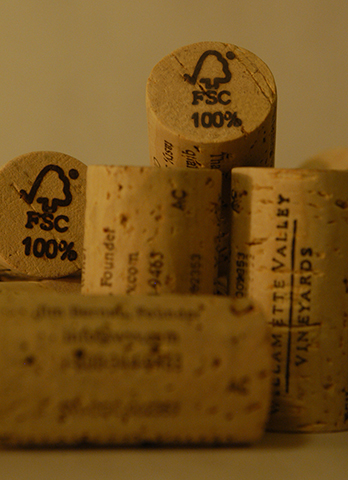 FSC® C006784
FSC® C006784
FSC® Certified Cork
Certified by Preferred by Nature to FSC® standards
Our winery was the first in the world to use cork certified through Preferred by Nature to FSC® standards. Cork is a natural, sustainable product where the cork tree is never cut down but continues to sequester carbon throughout its long life.
In 2010, Willamette Valley Vineyards was honored with the Sustainable Standard-Setter Award. Tensie Whelan, Director of the Center for Sustainable Business at NYU, commended us for our long-time leadership in agriculture and forestry: "Willamette Valley Vineyards' efforts to provide sustainable livelihoods, conserve biodiversity and minimize environmental impacts have solidified Willamette Valley Vineyards as a leader of sustainable agriculture and forestry. Willamette has long been at the forefront of environmental conservation by pursuing FSC®certified cork, waste management near riparian zones, and investment in alternative fuels."
Additionally, all of our bottle packaging materials are certified BPA-free, and we continue to promote continued sustainability through the founding of CorkReharvest, the first nationwide recycling campaign that continues today as Cork Forest Conservation Alliance.
We recycle the corks used with our wine bottles into high value products and encourage you to do so as well. Please consider recycling your leftover cork by utilizing Cork Dropboxes located in our Tasting Rooms, at Whole Foods Markets or other partner retailers.
To find a a local dropbox click here
Additional cork recycling locations can be found here
UV-C Light Technology
Willamette Valley Vineyards Deploys First UV-C Light Robot in Vineyards to Prevent Powdery Mildew
During the pandemic we were concerned for the safety of our teams and guests, so we invested in HVAC system improvements that purified the air using UV-C light technology developed by NASA, killing viruses in the air including COVID-19.
It was from that work that Founder Jim Bernau started reading about how a special band of ultraviolet light, UV-C, effectively kills fungus, including the biggest disease threat to our grapes: powdery mildew.
By teaming up with Saga Robotics, Cornell University and USDA scientists at Oregon State University, we are testing UV-C light with the world’s first autonomous, electric-powered robot to be used in a commercial vineyard. For us, the use of organic sulfur could be replaced, but for many farmers, fungicides would no longer be necessary.
Over 100 million pounds of chemical fungicides are used each year to prevent powdery mildew in the U.S. alone. The major pathogen, powdery mildew, is now developing chemical resistance in U.S. agriculture and requiring more frequent and higher doses of chemicals.
Our hope is that this technology revolutionizes the agriculture industry by reducing the use of harmful fungicides and chemicals while being cost effective for widespread adoption.
Many thanks to our Owners and Wine Club Members for their support in the purchase of this robotic invention from Norway — adding to our industry’s collective efforts to develop the most sustainable practices for agriculture.
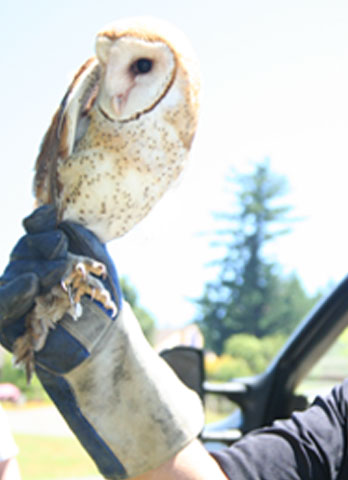
Owls and Kestrels
Barn Owls and Kestrels Help Protect our Vineyards
Since 2011, Willamette Valley Vineyards has partnered with Cascades Raptor Center in Eugene, Oregon, to place rehabilitated barn owls and kestrels in our vineyards for natural protection.
Before starting the program, Willamette needed an improved rodent management plan. Jan Bernau sought guidance from longtime friend and Cascades Raptor Center Founder Louise Shimmel to learn more about her raptor release program.
Next, Louise ensured the vineyard was safe for the birds and provided specifications for the necessary owl and kestrel homes. Dedicated volunteer and shareholder Joe Perez built the initial nesting boxes and – with help from Facilities Coordinator Randy Hillyer – hung these “bird condos” in our vineyard. Over time, the program expanded to our other vineyards. Joe and Randy continue to help maintain the nesting boxes.
Having these birds in our vineyards helps create a balanced ecosystem by controlling pest populations in a pesticide-free environment. Willamette continues to introduce new birds each year, including orphaned juvenile owls and a red-tailed hawk named Jory, who Cascades Raptor Center rescued in December 2022.
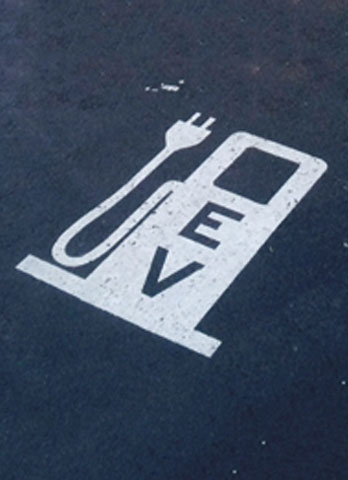
Energy Efficiency
Electric Vehicle Charging
Guests of the winery are welcome to use either of the dual-head electric car charging stations located in the hospitality parking lot. Look for the "EV" logo painted on the designated parking spaces to use this free service.
Learn more about electric vehicle tourism in Oregon Wine Country!
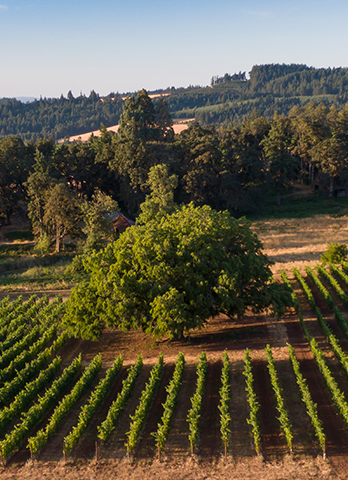
Willamette Valley Oak Accord
Protecting and Restoring our Beautiful Oak Trees
We were one of the founding signatories of Willamette Valley Oak Accord, a grassroots effort to protect and restore remaining oak habitat in the Willamette Valley. This is an important conservation effort that will preserve natural resources within our region and restore more than 1,500 acres of the Willamette Valley’s fragile ecosystem.
Wind & Solar Power
Powered by Wind
By partnering with PGE to provide wind-powered electricity, we have the same environmental impact as not driving 739,488 miles each year. Clean Wind is plentiful, renewable, widely distributed, produces no greenhouse gas emissions during operation, doesn't consume water and uses little land.
Solar Energy
Our Estate has twelve solar water heating collectors and 116 kilowatts of photovoltaic generation capacity that will reduce emissions from utility-supplied energy to prevent 1,780 tons of CO2 from entering the atmosphere. Additionally, we have invested in four solar energy projects with Advanced Energy Systems. These include two solar electric installations (458 panels in total) providing 139,000 kilowatt hours of electricity annually. On an equivalent basis, these solar power facilities offset the emissions from the consumption of 11,917 gallons of gasoline, amounting to a reduction of 117 tons of CO2 emissions each year.
Biodynamic Farming at Bernau Estate Vineyard
Biodynamic Sustainable Farming Practices
At Bernau Estate Vineyard, we are committed to becoming biodynamic certified. Biodynamics is a holistic, ecological and ethical way of farming used in all kinds of agriculture. It involves managing a farm utilizing the principles of a living organism. Applying biodynamics in the day-to-day operation of a farm, or in our case a vineyard, involves creating a farming system that is minimally dependent on outside materials to meet the needs of the land.
As of June 2019, we have completed a full cycle of biodynamic farming practices. Following the 2018 harvest, our team filled female cow horns with local manure and buried them in the soil for the winter. The manure in the horns transforms into a nutrient-rich preparation (called Biodynamic Preparation 500) that is attuned to the land. We unearthed the horns this spring to create a preparation that is enlivened with water and sprayed over the vineyard. Each horn produces enough to cover 1 acre of land with multiple sprays throughout the growing season. Biodynamic Preparation 500 has shown to accelerate and improve the soil structure, microbiological activity while enhancing a sense of place.
Supporting Native Bee Populations
We Love our Mason Bees!
We installed mason bee boxes at our Estate and Elton Vineyards to support healthy populations of these native pollinators. Mason bees are very productive spring pollinators for fruit and nut trees, as well as berry plants and spring flowers. With 40% of the insect population down and biodiversity declining, providing safe nesting places for these bees will help them thrive and increase their populations.
Learn more about mason bees on our blog.
Certified Vegan Wines
Animal-free Wines
Several of our wines are now Certified Vegan. Check the back wine label to see the certification logo.
Being Certified Vegan ensures that no animal, dairy or honey bee-derived ingredients are used to make our wines. There are only a handful of wineries in the United States that have gone through the rigorous steps to be Certified Vegan.
What does it mean to be "Certified Vegan?" Read more on our blog.
Recycling Water at the Estate
Recycling Water and Reducing Use
In 2018, our crew installed a new state-of-the-art greywater system. Going above and beyond DEQ code, this system will allow us to use significantly less water and will filter out organic solids for compost use. The recycled treated water can be used to irrigate landscape beds, potted plants and other non-food uses. Most importantly, this system ensures water used in our winemaking efforts is returned to the soil safely and efficiently.
Read how this new system is advancing the industry in the Oregon Wine Press.
First Oregon Winery to Commit to the Porto Protocol
Willamette Valley Vineyards is the first Oregon winery to commit to the Porto Protocol, a sustainability initiative that aims to motivate companies and individuals to do more to help the environment by being a catalyst for new ideas. Our state-of-the-art greywater system is currently being featured as a case study on their website.
Revino
Return your Revino bottle to Willamette Valley Vineyards!
Oregon wine enthusiasts will soon find some of their favorite wines packaged in Revino reusable bottles. These bottles offer an 85% reduction in carbon emissions compared to standard single-use glass bottles and can be washed and reused 25 to 50 times.
Revino's reusable bottles support the sustainable winemaking and farming principles practiced by Willamette Valley Vineyards since the winery’s founding in 1983. This innovative approach to packaging will help Willamette reduce its carbon footprint and offer customers another sustainable choice in our tasting rooms. To start, Willamette is using Revino glass to bottle our 2023 Whole Cluster Pinot Noir that will be sold in our tasting rooms.
Revino bottles are not just sustainable; they are also unique. Each bottle's base bears an outline of the state of Oregon. Look closely and you'll also see a distinctive ridge on the bottle’s neck.
Please return your Revino bottles to the Willamette Valley Vineyards tasting room locations. We will accept Revino bottles from any winery. Revino will redistribute the bottles.
You'll receive a 10-cent wine credit for each Revino bottle brought back to our locations! At our Estate winery, this is a recycling incentive Willamette has provided since 1991. At our other locations, we only accept Revino bottle returns.
Special offer: Return 6 empty Revino bottles to your nearest Willamette Valley Vineyards tasting room and receive a complimentary wine flight.
Sustainable Packaging
Willamette Valley Vineyards is transitioning our nationally distributed wines to more sustainable packaging featuring lightweight glass.
Glass is the largest driver of a wine's carbon footprint due to the heat and energy involved in its production. Our newer bottles are 27% lighter, a significant win for the planet.
With the lightweight bottles, we use less raw materials and energy to produce the glass and less fuel to transport it: We can add 509 more cases of wine to a single truckload, reducing the number of trips vehicles make to transport our wine and decreasing carbon dioxide emissions by around 10 metric tons.
Glass manufacturing leaves a large carbon footprint due to the heat and energy involved in its production. Opting for lighter glass helps us reduce the emissions from glass manufacturing by around 170 metric tons of carbon dioxide.
We're also transitioning to labels printed on Forest Stewardship Council (FSC®) certified labels made with 100% recycled paper. This small change is equivalent to 8,380 pounds of wood saved.
The winery is committed to finding new ways to reduce and offset our environmental impact. Thank you for supporting sustainable initiatives in Oregon winemaking and winegrowing.
Sign Up For Our Newsletter
Be among the first to hear about new releases, local events and wine specials.
Plus, receive complimentary shipping on your first order of $200+
